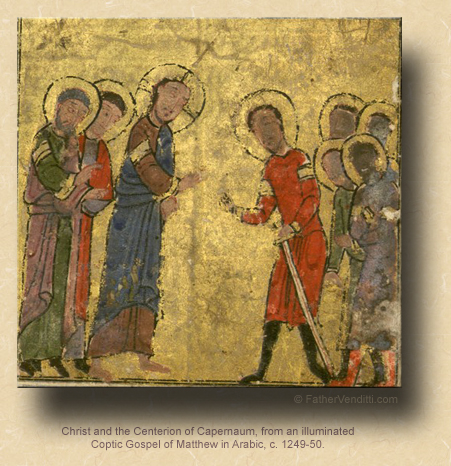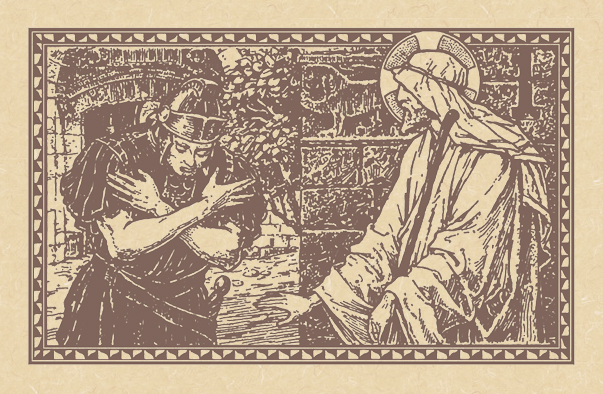The Harder the Nut, the Bigger the Nut Cracker.
The Memorial of Saint Francis Xavier, Priest.*
Lessons from the feria, according to the ordinary form of the Roman Rite:
• Isaiah 2: 1-5.
• Psalm 122: 1-9.
• Matthew 8: 5-11.
|
…or, from the proper:
• I Corinthians 9: 16-19, 22-23.
• Psalm 117: 1-2.
• Mark 16: 15-20.
…or, any lessons from the common of Pastors for Missionaries.**
|
The Third Class Feast of Saint Francis Xavier, Confessor; and, the Commemoration of the First Monday of Advent.***
Lessons from the proper, according to the extraordinary form of the Roman Rite:
• Romans 10: 10-18.
• Psalm 91: 13-14.
• Mark 16: 15-18.
FatherVenditti.com
|
 10:28 PM 12/2/2018 — With all due respect to the great Jesuit missionary, Saint Francis Xavier, whose memorial we observe today, our reflection today draws from today’s Gospel lesson for the first weekday of Advent. 10:28 PM 12/2/2018 — With all due respect to the great Jesuit missionary, Saint Francis Xavier, whose memorial we observe today, our reflection today draws from today’s Gospel lesson for the first weekday of Advent.
"Not even in Israel have I found such faith!" With those striking words our Lord surely must have stunned His disciples. He, after all was a Jew, and all His followers were Jews, and those that believed in Him surely believed Him to be the Messiah promised by the prophets, who were also Jews. Rome, remember, was the enemy; and this Roman, a worshiper of false gods and idols, an officer in the Roman Legion occupying Jerusalem, had more faith in our Lord than all of them combined, or so our Lord says. How is that possible?
Well, it’s possible because faith is a gift. God can give it to whomever He chooses. To be sure, it was the leaders of our Lord’s own religion who delivered Him over to death, not the Romans; Pilate, remember, wanted to let Him go, and acquiesced only because he feared a riot instigated by the Synagogue leaders. And just to make sure that the lesson is not lost on His disciples, our Lord says it very bluntly: "…there are many who will come from the east and from the west, and will take their places in the kingdom of God with Abraham and Isaac and Jacob…" (Matt. 8: 11 Knox).
“Many will come from East and West.” There is no geographical boundary to salvation. It is faith—not location, race, national origin, or political allegiance—which determines favor in God’s eyes. The centurion, after all, wasn’t a Jew or a Christian. He was just a man with a problem, and he took that problem to our Lord with faith and humility. He wore the uniform of Rome, and probably sacrificed to the Roman Gods; but, it was in a moment of crisis—the pending death of someone close to him—that the truth of his character became apparent.
The shame, of course, is that it had to come to that. So often it’s the case, isn’t it? It takes some kind of crisis to bring us to our spiritual senses. Of course, it means that the faith is there to begin with, but we hide it. Maybe we’re embarrassed; maybe we’re lazy; maybe we’re just too distracted by the obligations of our daily lives to pay much attention to our interior life or the obligations of our faith.  Where I was once pastor there was a young woman who’s husband passed away very young. They weren’t church goers. And it wasn’t until after her husband’s death that she started coming to church weekly, which is good. But why did it have to take a tragedy? Where I was once pastor there was a young woman who’s husband passed away very young. They weren’t church goers. And it wasn’t until after her husband’s death that she started coming to church weekly, which is good. But why did it have to take a tragedy?
What we have to be conscious of is the fact that the Lord wants us, and He’s not going to let us get away that easily. We’re always free to reject Him if we want. But most of us don’t reject the Lord outright: we just put Him on the back burner; we hold Him in reserve until we think we need Him. And when we do that it is almost certain that the Lord is going to arrange for us to need Him, because He wants us. And whatever it takes for us to realize that we need Him is really up to us. The harder the nut, the bigger the nut cracker. Take the case of Lazarus. Our Lord admits to His disciples that the reason He delayed to go to his friend Lazarus when he was sick was to bring people to the faith. Now, we can say that it’s cruel for Him to have allowed His friend to die just so He could raise him from the dead and convert some people; but, what price do you put, then, on faith?
If we are people of faith, as surely we must be—otherwise, why are we here?—then we must place some kind of value on our faith. And when we face a crisis in our lives, and we don’t know the reason for it, it might be just that: that we have not yet learned to trust the Lord as we should. And some people can’t learn to trust the Lord until everything else they trust has been taken from them.
Our goal, of course, should be to have a faith and a trust in Christ that doesn’t require a crisis to make it first in our lives. But if we should fall short in that regard, and a crisis does befall us, it is wise to remember that there is a reason for everything. It may not be the reason we think, and it may even be a reason that we refuse to see because it concerns a shortcoming in our lives that we’re not willing to admit;—it is, after all, common for people in a crisis to blame everything and everyone other than themselves—but it is for a reason that Christ sometimes calls us His children; you often must force a child to do things he doesn’t want to do precisely because he doesn’t see the need to do them.
It took a crisis for our Lord to bring the centurion to faith. But when He did, the faith of that centurion was greater than that of all his disciples. Let’s pray that it won’t take such a crisis to bring us to the realization of our faith; but, if it should happen, let’s also resolve that we won’t turn away from Him in bitterness, but rather turn to Him in gratitude and need. Faith, indeed, is a gift; and it’s such a great gift, that some people have to be forced to accept it. But there is nothing that we have and nothing that we love that is more important.

* One of the first companions of Ignatius Loyola, Francis Xavier became one of the greatest missionaries of all time, preaching the Gospel and converting thousands in India and Japan. He died in 1552 on route to China.
** It's clear that not much thought was put into the decision of the post-Vatican II reformers regarding how to handle the "memorials" of saints during privileged seasons. Pope Benedict hinted at the solution when he suggested that the celebration of the extraordinary form should inform the celebration of the ordinary form. Unfortunately, this has been largely ignored. In the regime of Pope Francis, it's clear that the sacred liturgy is not a priority.
*** In the extraordinary form, Third Class Feasts during Advent must be observed, with the Advent feria commemorated with the ferial Collect, Secret and Postcommunion added to those of the feast. Any additional commemorations for saints may be observed at the discretion of the priest, with the Advent feria being observed as a commemoration in the same way. No exclusive Mass is permitted for the commemoration of the Advent feria. Cf. the post here for more information.
|

